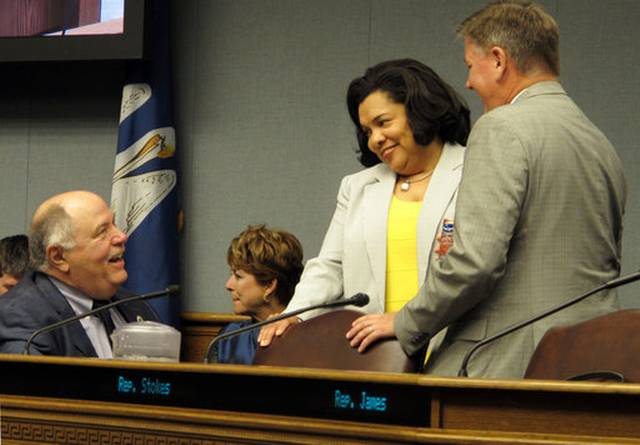BATON ROUGE — Lawmakers on the House tax committee Tuesday rejected a package of income tax changes pushed by Gov. John Bel Edwards that were projected to cut Louisiana taxes for most individuals by shifting a higher tax burden to businesses.
The decisions by the majority-Republican Ways and Means Committee dealt another blow to the Democratic governor’s effort to rewrite Louisiana tax laws to help end cycles of budget shortfalls and address the looming expiration of $1.3 billion in annual tax collections in mid-2018.
Edwards already had shelved his main business tax proposal rather than face certain defeat from the committee. The committee has resisted supporting anything that could boost taxes on businesses, saying companies already are struggling to overcome a state recession.
The income tax approach shot down Tuesday had been championed by a task force created by lawmakers to recommend ways to improve Louisiana’s tax structure and stabilize its finances.
The bills sponsored by Republican Rep. Rob Shadoin, of Ruston, would have done away with an income tax deduction people and businesses get for the federal income taxes they pay. In exchange, income tax rates would have dropped for individual taxpayers, and would have changed in varying ways for corporate taxpayers.
“It is disappointing that a small group of members on the House Ways and Means Committee would block a tax cut for 90 percent of individual tax filers in Louisiana, but refused to ask the 80 percent of corporations that pay absolutely nothing in state income taxes to pay their fair share,” Edwards said in a statement. “That is a severe case of misplaced priorities.”
Some lawmakers objected to increasing taxes on higher earners, while others said they preferred a flat-tax approach where everyone is charged the same rate, rather than escalating rates based on their income.
Revenue Secretary Kimberly Robinson said taxpayers earning more than $140,000 a year on average would have paid more under the changes, while those paying taxes on earnings below that amount would have paid less. A financial analysis estimated Louisiana would have collected $45 million less a year from personal income taxpayers, while companies would have paid $66 million more.
In jettisoning the package, 7 lawmakers voted for the first proposal, while 11 voted against it. After that, all the bills were shelved without objection.
The House panel also voted down a business tax rewrite from Rep. Kenny Havard, a St. Francisville Republican, that had once drawn interest as a possible method to raise additional dollars for the state.
Havard’s bill would have enacted a new business tax for larger companies that file taxes through the state’s corporate income and franchise tax laws. Those income and franchise taxes would go away, replaced with what Havard called a “profit margins tax.” Companies would have been unable to take advantage of some loopholes that let them lower their Louisiana tax payments.
Rep. Alan Seabaugh, a Shreveport Republican, said that although he appreciated Havard’s work, the concept was too sweeping a change: “It’s a radical departure from the way we’ve done things.”
Havard said radical change was required for “meaningful tax reform.”
He only got two votes in support of his proposal and 11 votes against it.
Later in the day, state senators spurned a proposal to limit a property tax break given to manufacturers.
Sen. J.P. Morrell, a New Orleans Democrat, wanted to scale back the program so it couldn’t apply to the portion of property taxes dedicated to public schools, starting in 2019. But the constitutional amendment ran into opposition from business groups, particularly the Louisiana Chemical Association.
Opponents said the change would make Louisiana less competitive in attracting business deals. Morrell said similar industrial property tax exemption programs in other states, including Mississippi and Texas, carve out money for schools as he proposed.
Only 13 senators voted for the amendment, while 24 voted against it. The proposal needed 26 votes to pass.

